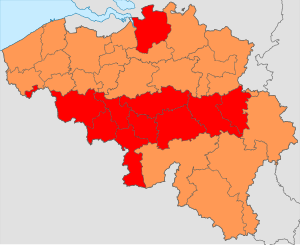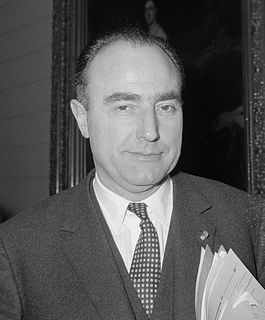
Belgium is a federal state with a multi-party political system, with numerous parties who factually have no chance of gaining power alone, and therefore must work with each other to form coalition governments.

General elections were held in Sweden on 15 September 1985. The Swedish Social Democratic Party remained the largest party in the Riksdag, winning 159 of the 349 seats. Its leader, Olaf Palme, kept his position as Prime Minister. He would retain this position successfully until his assassination in 1986.

General elections were held in Luxembourg on 12 June 1994, alongside European Parliament elections. The Christian Social People's Party remained the largest party, winning 21 of the 60 seats in the Chamber of Deputies. It continued the coalition government with the Luxembourg Socialist Workers' Party.

Parliamentary elections were held in Slovakia on 17 June 2006. Direction – Social Democracy emerged as the largest party in the National Council, winning 50 of the 150 seats. Its leader Robert Fico was appointed Prime Minister on 4 July 2006, leading a three-party coalition.
General elections were held in Luxembourg on 21 October 1945. They were the first elections held after the German occupation during World War II. As a result of the war, the political alliances of the interwar period had been ended. In their place were new parties; the Christian Social People's Party, the Luxembourg Socialist Workers' Party, and the Patriotic and Democratic Group in place of the Party of the Right, Socialist Party, and Radical Liberal Party respectively. It is regarded as a realigning election, as the election established the party political order, with four established parties, that would be maintained until 1974.

Folketing elections were held in Denmark on 26 April 1920, except in the Faroe Islands, where they were held on 20 May. The election campaign was the most aggressive and bitter in Denmark in the 20th century. Voter turnout was 80.6% in Denmark proper and 58.8% in the Faroe Islands.

General elections were held in Belgium on 17 February 1946. The result was a victory for the Christian Social Party, which won 92 of the 202 seats in the Chamber of Representatives and 51 of the 101 seats in the Senate. Voter turnout was 90.3%.

General elections were held in Belgium on 26 June 1949. Several reforms took effect prior to the elections; they were the first after the introduction of universal women's suffrage; the number of seats in the Chamber of Representatives was increased from 202 to 212, and from now on, elections for the nine provincial councils were held simultaneously with parliamentary elections. The number of Chamber seats and the simultaneous provincial and parliamentary elections would remain unchanged until state reforms in 1993.

General elections were held in Belgium on 11 April 1954. The dominant Christian Social Party won 95 of the 212 seats in the Chamber of Representatives and 49 of the 106 seats in the Senate. Voter turnout was 93.2%. Elections for the nine provincial councils were also held.

General elections were held in Belgium on 1 June 1958. The result was a victory for the Christian Social Party, which won 104 of the 212 seats in the Chamber of Representatives and 53 of the 106 seats in the Senate. Voter turnout was 93.6% in the Chamber election and 93.7% in the Senate election. Elections for the nine provincial councils were also held.

General elections were held in Belgium on 26 March 1961. The result was a victory for the Christian Social Party, which won 96 of the 212 seats in the Chamber of Representatives and 47 of the 106 seats in the Senate. Voter turnout was 92.3%. Elections for the nine provincial councils were also held.

General elections were held in Belgium on 23 May 1965. The result was a victory for the Christian Social Party, which won 77 of the 212 seats in the Chamber of Representatives and 44 of the 106 seats in the Senate. Voter turnout was 91.6%. Elections for the nine provincial councils were also held.

General elections were held in Belgium on 7 November 1971. The result was a victory for the Christian People's Party, which won 40 of the 212 seats in the Chamber of Representatives and 34 of the 106 seats in the Senate. Voter turnout was 91.5%. Elections to the nine provincial councils were also held.
The 2007–2011 Belgian political crisis was a period of tense communal relations and political instability in Belgium rooted in the differing opinions on state reform, and in the continued existence of the controversial electoral district of Brussels-Halle-Vilvoorde (BHV). Parties from the Dutch-speaking Flemish Community are in general strongly in favour for a devolution of powers to the communities and regions, and the splitting of the unconstitutional BHV district, while French-speaking French Community of Belgium is generally in favour of retaining the status quo. After the 2010 elections, the topics of public debt, deficit cuts and socio-economic reform were added to the debate, with most Flemish parties in favour of finding money by strongly reducing spending, whilst the proposals supported by most French-speaking parties also included a significant raise in taxes. The crisis came to an end in December 2011 with the inauguration of a new federal government which agreed on partition of the BHV district and on policies aimed at tackling the economic downturn. The country's continuing linguistic divide played a large part in the crisis. Several times during the period Belgium was threatened to be split up amid rising Flemish separatism.

Legislative elections to elect members of the Imperial Council were held in Cisleithania, the Austrian section of Austria-Hungary over several days in June and July 1911. A coalition of German national and liberal parties, the Deutscher Nationalverband, emerged as the largest bloc in Parliament, holding 100 of the 516 seats. Voter turnout was 80.2%.

Full general elections were held in Belgium on 14 October 1894, with run-off elections held on 21 October 1894.

Parliamentary elections were held in Hungary on 25 and 26 January 1920. However, they were only held in 164 districts. After the Treaty of Trianon was signed, the 44 districts previously occupied by Romania voted between 13 June and 5 July, whilst the 11 districts occupied by Serbia did not vote until 30 and 31 October 1921. The election was held with compulsory voting. In protest at this and other changes to the franchise that left 60% of the voting age population unable to vote, the Hungarian Social Democratic Party boycotted the elections, and called for its supporters to cast invalid votes, resulting in an unusually high number of blank or invalid votes - 11.8% in the January elections and over 20% in Budapest and other major cities.

General elections were held in Liechtenstein on 11 March 1918, with a second round on 18 March. They were the first elections held in the country contested by political parties, as the Christian-Social People's Party and Progressive Citizens' Party had been founded that year. The Progressive Citizens' Party emerged as the largest in the Landtag, winning seven of the 12 elected seats.

General elections were held in Liechtenstein on 25 March 1962. The Progressive Citizens' Party won eight of the 15 seats in the Landtag, but remained in coalition with the Patriotic Union. This was the first election contested by the Christian Social Party.

The Catholic University of Leuven was one of Belgium's major universities which split along linguistic lines after a period of civil unrest in 1967–68. It is commonly known as the "Leuven Affair" in French and, based on a slogan of the time, as "Flemish Leuven" in Dutch. The crisis shook Belgian politics and led to the fall of the government of Paul Vanden Boeynants. It marked an escalation of the linguistic tension in Belgium after World War II and had lasting consequences for other bilingual institutions in Belgium within higher education and politics alike.























